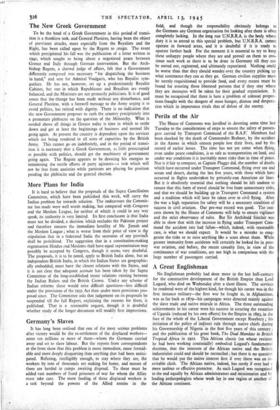More 'Plans for India
It is hard to believe that the proposals of the Sapru Conciliation Committee, which have been published this week, will carry the Indian problem far towards solution. The endeavours the Commit- tee has made were well worth making, but compared with Congress and the Moslem League, for neither of which it could in any way speak, its authority is very limited. Its first conclusion is that India must not be divided, a decision which excludes the Pakistan project and therefore ensures the immediate hostility of Mr. Jinnah and the Moslem League ; what is worse from their point of view is the stipulation that in a federated India the secession of any provinA shall be prohibited. The suggestion that in a constitution-making organisation Hindus and Moslems shall have equal representation may possibly be accepted by Congress, though it seems very doubtful. The proposals, it is to be noted, apply to British India alone, but an independent British India, in which the Indian States are geographic- ally embedded, must have the closest relations with the States, and it is not clear that adequate account has been taken by the Sapru Committee of the long-established treaty relations existing between the Indian Rulers and the British Crown. Under any scheme of Indian reforms these would raise difficult questions—less difficult under the provisions of the 1935 Act than under most provisions pro- posed since. The Committee asks that judgement on its proposals be suspended till the full Report, explaining the reasons for them, is published. That is a reasonable request, though it is doubtful whether study of the longer document will modify first impressions.


























 Previous page
Previous page